As we continue on our journey looking back on the history of the Rugby World Cup, the 1995 edition brings us to South Africa for the final major tournament of the amateur era.
To this day, the 1995 World Cup stands out as the most iconic of the lot, encapsulated by the sight of Nelson Mandela handing the Webb Ellis trophy to Springbok captain Francois Pienaar, a moment later portrayed by Morgan Freeman and Matt Damon in the 2009 movie 'Invictus'.
It was the second home-winner out of three since the first tournament in 1987, on this occasion South Africa defeating New Zealand 15-12 after a tryless final in Johannesburg, with Joel Stransky's dropgoal seven minutes from the end of extra time giving the home side a fairytale ending.
The 1995 Rugby World Cup also gave us the game’s first true superstar, as a 20-year-old All Black winger named Jonah Lomu (below) announced himself on the global stage with a joint-high seven tries before New Zealand came up short in the decider.
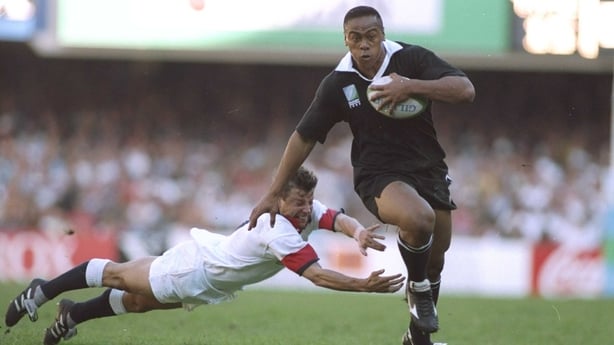
The Hosts
Having been readmitted to international rugby in 1992 following the end of apartheid, South Africa were awarded hosting rights for the tournament in 1993.
It was the first major international sports tournament to take place in the country since apartheid was abolished, while it's believed that the decision by the South African Rugby Board to vote in favour of the initial Rugby World Cup in 1987 played a major part in them being awarded the hosting rights.
With this being the first Rugby World Cup staged in a single country, there was finally a bit of sense to the stadiums used. With a ridiculous 19 different grounds staging games in the 1991 tournament across Britain, Ireland and France, a much more sensible nine venues were chosen for 1995.
Stellenbosch, East London, Bloemfontein, Port Elizabeth and Rustenburg all hosted games during the pool stages, while the knockout games were played across the four major stadiums; King’s Park in Durban, Newlands in Cape Town, Loftus Versfeld in Pretoria, and Ellis Park in Johannesburg, the latter of which staged the final between hosts South Africa and New Zealand.
Pools
Pool A: South Africa, Australia, Romania, Canada
Pool B: England, Western Samoa, Italy, Argentina
Pool C: New Zealand, Ireland, Wales, Japan
Pool D: France, Scotland, Tonga, Ivory Coast
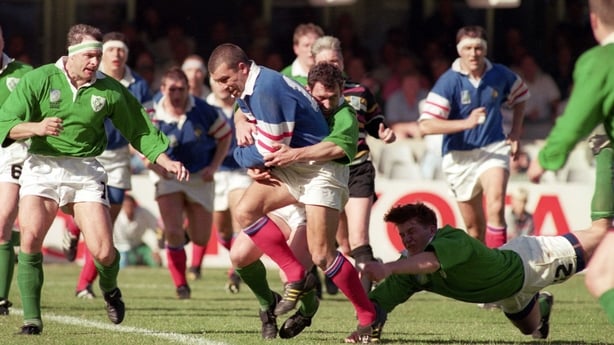
Ireland
It was still a few months before rugby’s administrators officially opened the doors on a professional game, but while many of game's leading nations were pros in all but name, Ireland were the very definition of amateurs.
Having taken over as head coach from Ciaran Fitzgerald in 1992, his former assistant Gerry Murphy had set about turning Ireland’s fortunes around.
"You get into the habit of losing, so my priority has to be somehow to inspire a victory of any kind," he said after his appointment in December 1992.
"Anything will do me: even 1-0 against Scotland would be fine, if you know what I mean."
Unfortunately for Murphy and Ireland, things didn't got much better. Three consecutive fourth place finishes in the Five Nations had set modest expectations for Ireland as they approached the 1995 World Cup, and they warmed up for the tournament by losing 22-12 to Italy in Treviso. It was the Azzurri’s first ever win against one of the major eight rugby nations.
Ireland's World Cup peaked after seven minutes; the late Gary Halpin steamrolling his way through three New Zealand forwards to score an early Irish try, which he infamously celebrated by flipping his middle fingers at the All Blacks. New Zealand eventually won 43-19, with the electric Lomu scoring two tries.
An easy win against Japan followed, before a winner-takes-all game against Wales for a place in the quarter-final. Tries for Eddie Halvey, Nick Popplewell and Denis McBride, as well as nine points off the boot of Eric Elwood saw Ireland sneak a 24-23 win against the Welsh.
"We scraped it by a point, but it goes down as one of worst games of rugby in the history of mankind," said Conor O’Shea of that game in Tom English’s book 'No Borders’.
As was now becoming a habit, Ireland’s World Cup ended in the quarter-final with a 36-12 defeat to France in Durban.
The Cork Examiner’s headline the following Monday summed it all up: ‘End of the world and light years behind’.
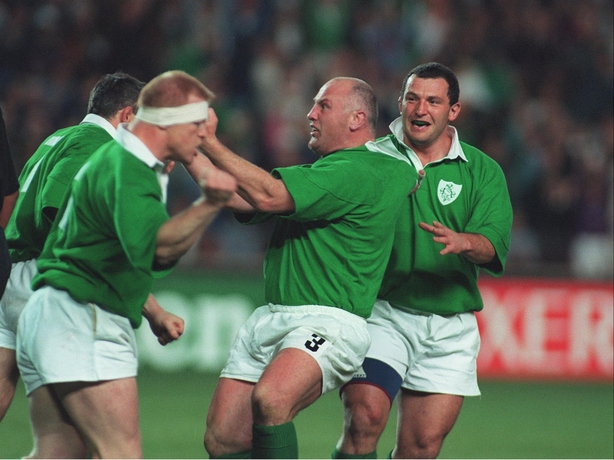
Ireland squad: Terry Kingston (capt), Keith Wood, Nick Popplewell, John Fitzgerald, Gary Halpin, Paul Wallace, Neil Francis, Gabriel Fulcher, Davy Tweed, Paddy Johns, Eddie Halvey, Denis McBride, David Corkery, Anthony Foley, Niall Horgan, Michael Bradley, Eric Elwood, Paul Burke, Brendan Mullin, Jonny Bell, Simon Geoghegan, Richard Wallace, Darragh O’Mahony, Jim Staples, Conor O’Shea
Results
Pool C: Ireland 19-43 New Zealand (27 May - Ellis Park, Johannesburg)
Pool C: Ireland 50-28 Japan (31 May – Free State Stadium, Bloemfontein)
Pool C: Ireland 24-23 Wales (4 June – Ellis Park, Johannesburg)
QF: France 36-12 Ireland (10 June - Kings Park, Durban)
As well as being the last Rugby World Cup of the amateur era, the 1995 tournament was also the last 16-team tournament, before it was expanded to 20 in 1999.
With South Africa making their long-awaited debut at the championship, there was also a first and only appearance of Ivory Coast as Africa’s second representative, having held off competition from Zimbabwe, Namibia and Morocco to come through and take the qualification spot.
As was an issue both before and since, the gulf between the top-eight teams in the world and the rest was leading to some one-sided games; New Zealand’s 145-17 win against Japan in Pool C remains the highest scoring game in the history of the Rugby World Cup, with only Australia’s 142-0 beating of Namibia in 2003 seeing a larger margin of victory.
The All Blacks scored 21 tries that day, with a hattrick apiece for Jeff Wilson and Eric Rush, while Marc Ellis score the first and only double-hattrick in the tournament’s history.
Out-half Simon Culhane’s 45 points that day (20 conversions and a try) saw him set a new single-game record, overtaking Scotland’s Gavin Hastings, whose record of 44 points (4 tries, 9 conversions, 2 penalties) in their 89-0 win against Ivory Coast lasted just over a week. That Scottish victory also provided another handy tablequiz question as the first of what is now 15 times that a team has been "nilled" at the Rugby World Cup.
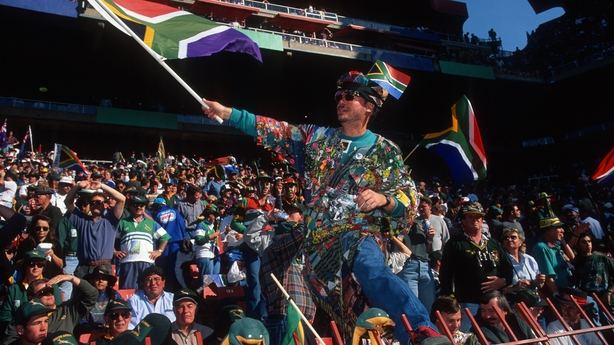
In the end, there was a predictable set of quarter-finalists; South Africa topped Pool A and comfortably saw off Western Samoa to reach the final four, France easily got the better of Ireland, England edged out Australia in their quarter, and would come up against a New Zealand side who continued to blaze a trail through the tournament with a 48-30 win against Scotland.
As mentioned above, the 1995 tournament eventually led to a Hollywood blockbuster, and while the first few rounds didn't provide much in the way of drama, things caught fire from the semi-finals on.
Jonah Lomu had given the rugby world a taste of his brilliance with a couple of tries against Ireland and another versus Scotland in the quarters, but it was in the semi-final against England where he truly announced himself to the sport.
The 20-year-old scored four tries in that 45-29 win against England, but it was his first, just two minutes into the game, that will go down as one of the most memorable in World Cup history.
It started 35 metres out from the line, as he ran sideways to collect an overthrown pass from Graeme Bachop, before he shrugged off the first tackle attempt from Rory Underwood. Will Carling was next to have a go, but the best he could do was skim the winger’s legs as he raced down the wing. It was enough to knock Lomu off his stride, and as he reached the final defender, Mike Catt, he was stumbling forward.
It didn’t matter. Despite being off balance, Lomu went through Catt (below) like he wasn't even there, leaving the current Irish coach on his backside as he crossed the line to score.
The second semi-final, between hosts South Africa and France, very nearly didn’t happen. A deluge of rain landed on Kings Park in Durban ahead of that semi-final, causing kickoff to be delayed by more than an hour, as dozens of local volunteers played their part in the World Cup campaign by sweeping the excess water off the pitch.
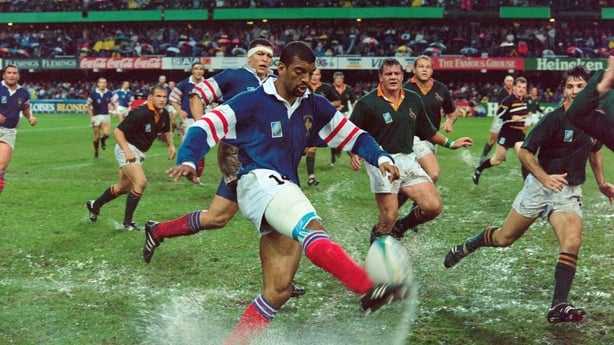
For a time it looked like the game would have to be cancelled altogether, which would have seen South Africa eliminated at the expense of France.
The tournament rules dictated that in the event of a cancellation, the team with the better disciplinary record would be awarded the win, and with the Springboks’ hooker James Dalton having been red-carded in their 20-0 win against Canada in the pool stage, that dust-up in ‘The Battle of Boet Erasmus’ would have cost South Africa a place in the final.
After more than an hour of brushing, the level of water that remained on the pitch would certainly have seen it called off in 2023, but by 1995 standards it was game on. South Africa did just enough against the French, wading their way to a 19-15 win.
The final wasn’t a classic. Joel Stransky and Andrew Mehrtens traded three-pointers as the sides finished level at 9-9 after 80 minutes, and it was 12-12 heading into the second half of extra time before Stransky’s dropgoal with seven minutes to play saw the Springboks claim the first of what is now three world titles.
The fallout of that final has been legendary. Having scored a minimum of 34 points in every game leading up to the final, many were surprised about the impotency of the New Zealand attack in the decider, before it emerged that the squad had been hit with a bout of food poisoning the night before the game.
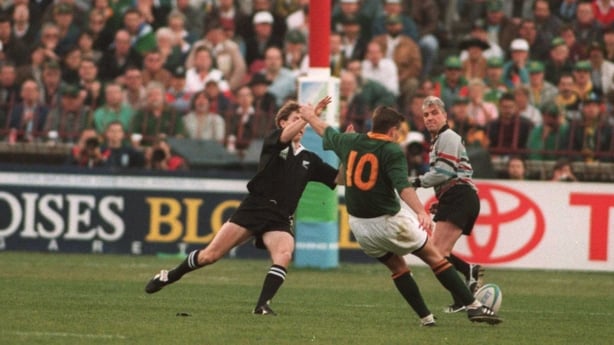
Those in the All Blacks camp suspect foul play in what led to upwards of 30 players and officials being hit with vomiting and diarrhea, with all the blame being laid on a rogue waitress named "Suzie" who they claim tampered with their food..
To add insult to injury – or in this case illness – there was also high drama at the end-of-tournament banquet, as New Zealand’s player stormed out of the room after comments made by the South African rugby president Louis Luyt.
"There were no true world champions in the 1987 and 1991 World Cups because South Africa were not there. We have proved our point," he pronounced, sparking Fitzpatrick and his teammates to walk out of the ceremony.
Luyt wasn't finished there, though. In an ill-advised move, he made the surprise presentation of a £1,000 gold watch to Welsh referee Derek Bevan, the same referee who had denied France a late try when the sides had met in the semi-final.
"It was something I could have done without," a diplomatic Bevan said.
Twenty eight years on, there’s a poignancy in looking back at the 1995 tournament.
The Ivory Coast’s World Cup debut came at a terrible cost when winger Max Brito suffered a life-changing injury in their pool game against Tonga. Brito was left a tetraplegic after getting trapped in a ruck in the early stages of the game, and died in 2022 at the age of 54.
A terrible number of stars from that tournament have also passed away. In 2015, the rugby world lost Jonah Lomu, who had been dealing with a kidney disorder for close to 20 years.
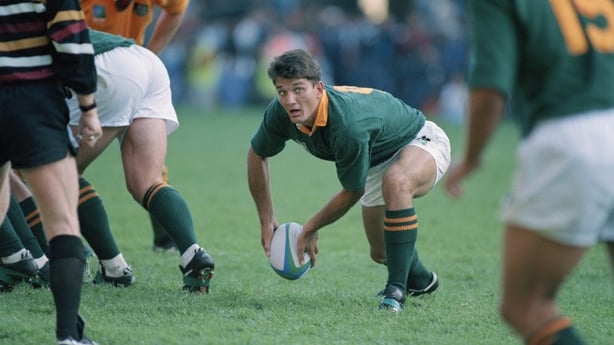
The World Cup-winning Springboks have seen four of their teammates die, as well as their coach Kitch Christie who passed away in 1998.
Flanker Ruben Kruger passed away in 2010 at the age of 39 after a long battle with cancer, before Joost van der Westhuizen lost his fight with motor neuron disease in 2017. There was to be further tragedy in 2019, when James Small and Chester Williams both died suddenly from heart-attacks within the space of two months. The pair had both started on the wing in the final against the All Blacks.
Closer to home, that Irish squad contained a 21-year-old Anthony Foley, whose sudden death in 2016 rocked Irish sport, before Gary Halpin - scorer and celebrator of that try against New Zealand - passed away in February 2021 at the age of 55.
Top points scorers:
Thierry Lacroix (France): 112 points
Gavin Hastings (Scotland): 104 points
Andrew Mehrtens (New Zealand): 84 points
Top try scorers:
Jonah Lomu, Marc Ellis (New Zealand): 7 tries each
Gavin Hastings (Scotland), Rory Underwood (England): 5 tries
Adriaan Richter, Chester Williams (New Zealand), Thierry Lacroix (France): 4 tries
Watch live coverage of Ireland's Rugby World Cup warm-up games v Italy (5 August), England (19 August) and Samoa (26 August) live on RTÉ2 and RTÉ Player, listen to live commentary on RTÉ Radio 1 or follow a live blog on RTÉ.ie and the RTÉ News app.


